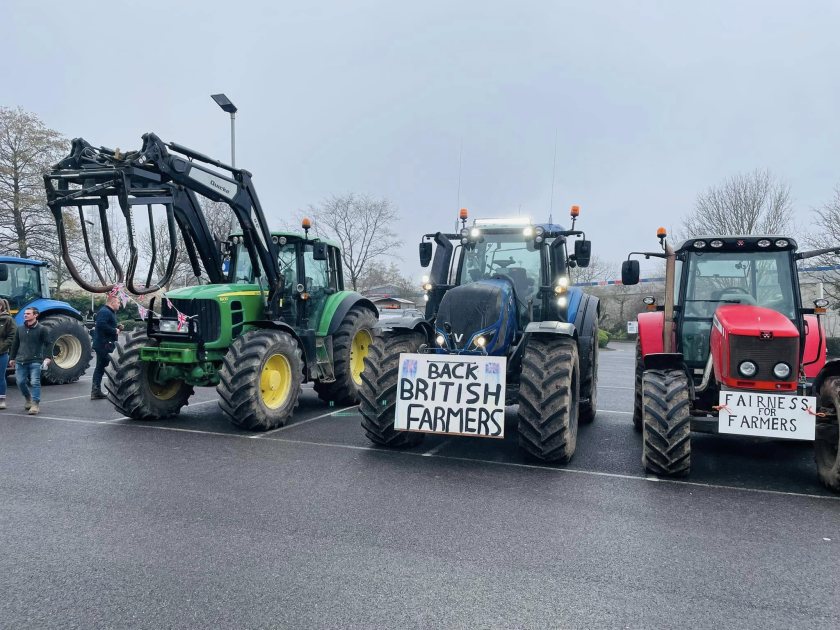
The government has unveiled new measures to help dampen industry criticism following the budget, including new planning reforms and a pledge to buy more British food for the public sector.
Defra Secretary Steve Reed today (9 January) set out Labour's vision to 'make farming more profitable' as he speaks to delegates at the Oxford Farming Conference.
Measures in the so-called 'new deal' for farming include a 'cast iron commitment' to food security, as well as reforms to help farmers diversify their income streams.
In a UK-first, Mr Reed confirmed that the government will monitor food currently bought in the public sector and where it is bought from.
The move, included in Labour's election manifesto, will make it easier for farmers to win a share of the £5 billion spent each year on public sector catering contracts.
Farmers will also be able to make additional money from selling surplus energy from solar panels and wind turbines, as the 1MW cap will be removed making it easier to install solar on rooftops and barns.
The NFU said while there were 'positive elements' to the measures, the government had failed to recognise that farmers were in a 'cash flow crisis'.
The union warned that many farming businesses across the country 'won’t survive to benefit from the 'new deal''.
It follows the government's autumn budget, which included controversial inheritance tax changes, national insurance hikes, cuts to direct payments and delays to environmental schemes.
Labour's 'new deal' for farming contains a series of measures that it hopes will sweeten the industry, following a series of UK-wide protests in the past few months, including two in London.
As part of the package of measures, planning law will be reformed to make it easier for farmers to build more buildings, barns and other infrastructure they need to boost food production.
Mr Reed also issued a new pledge in upholding British farmers' high environmental and animal welfare standards in any future post-Brexit trade deals.
However, there was no update on the controversial farm inheritance tax plans, set to come into effect in April 2026.
At the Oxford Farming Conference, the Secretary of State outlined his vision for the future of farming in three parts - food production, business resilience and nature restoration.
“The primary purpose of farming has - and always will be - to produce the food that feeds the nation," Mr Reed told delegates.
“Too many policymakers in Whitehall lose sight of that fact. This government is putting food production firmly back on the agenda.”
He said: “We will work in partnership to achieve our vision for the farming sector. First, a sector whose primary purpose is food production.
"Secondly, a sector where farmers can access diverse income streams to make a fair profit and ensure their business remains viable in times of challenge.
"And thirdly, a sector which supports farmers to restore nature – the foundations of sustainable food production.
“It is only through pursuing all three that we will achieve long-term food security," Mr Reed said.
Industry concern still continues to persist following the budget on 30 October 2024, with one worry the confirmed acceleration of the end of the direct payment phaseout.
These are expected to be 100% reductions on all values in excess of £30,000, while all claims up to £30,000 will be reduced by 76%.
This means the maximum level of delinked payment proposed for 2025 will be limited to £7,200 in light of these announced figures.
Responding to the 'new deal', the NFU said that many farmers "are worried about making it to the end of 2025, never mind what happens 25 years down the line."
"How is [government] going to ensure food production is profitable when thousands of farmers and growers are questioning whether they’ll still be in the industry in the next year?" asked Tom Bradshaw, NFU president.
“The government must now face up to the reality of the fierce policy headwinds and challenging market conditions the industry is facing into and act to secure the future of British farming."
He added: "Its first priority as a matter of urgency must be to pause and consult on changes to Agricultural and Business Property Relief and review the delays and challenges to agri-environmental schemes.
“To have a genuine reset moment with farmers and growers after the inflationary budget, all of these issues need to be addressed. Only then can the government’s long-term vision be achievable."
The British Free Range Egg Producers Association (BFREPA) welcomed the government's new measures, but said there were a 'number of elephants in the room'.
"Recent changes to IHT is, arguably, the largest, significantly undermining, as it does, farmers confidence," the body warned.
"Confidence is everything in this business and is the foundation for investment and growth.
"A first priority must be to pause and consult on changes to Agricultural and Business Property Relief."
The association also warned that the 'genie is already out of the bottle' as a result of trade deals entered into by the previous Conservative government, for example the CPTPP trade deal.
"Nonetheless, the government upholding and protecting our high environmental and animal welfare standards in future trade deals is welcomed," it said.
